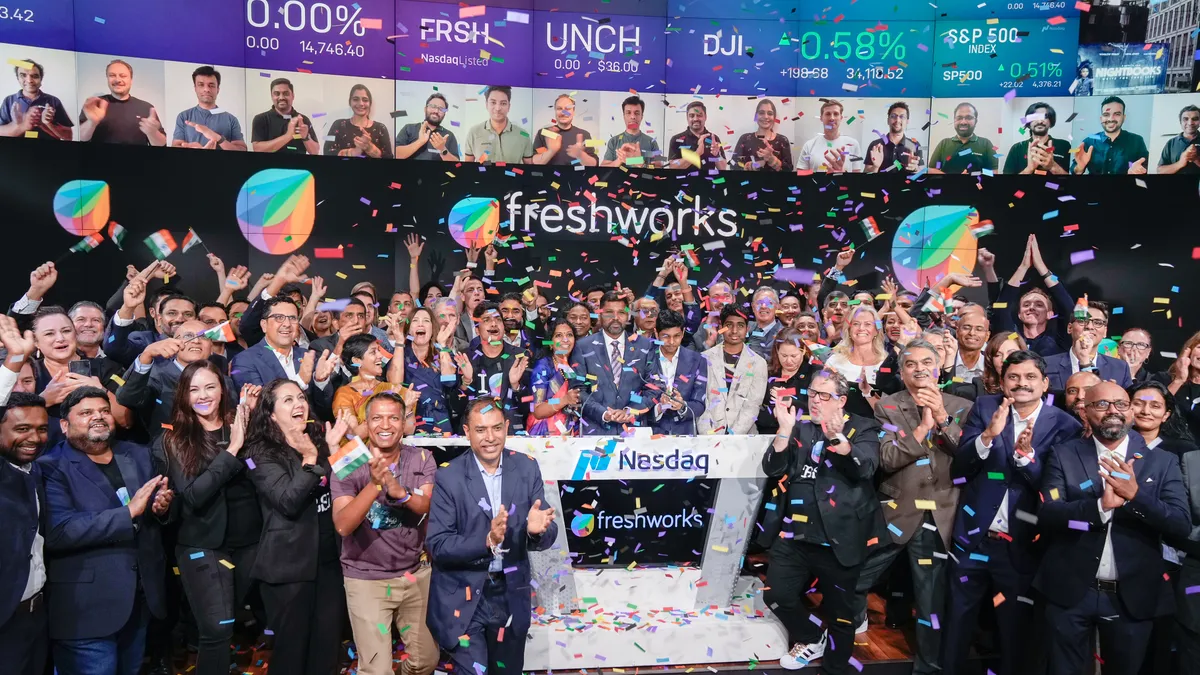Freshworks, an Indian startup aimed as an answer to Salesforce, began trading on the New York Stock Exchange Wednesday. The company, India’s best known software-as-a-service firm, opened at $43.40 per share after pricing at $36 per share. In this offering, it has so far raised over $1 billion, which values the company at over $10 billion.
Freshworks is India's oldest SaaS unicorn, a term for startups with a valuation in excess of $1 billion, and is its first to go public on Nasdaq.
Founded in 2010, it follows a string of other India-based startups going public this year, or announcing plans to. In June, fintech Paytm filed for the country’s largest-ever tech IPO, at $2.2 billion, followed by food delivery company Zomato, which made its Mumbai stock market debut in July.
The Indian SaaS industry could reach a $1 trillion valuation, and create almost 500,000 jobs in the country, a McKinsey report found, according to CNN.
In 2021, India-based startups have raised $10 billion through IPOs, the report said, and investors expect the pipeline to remain robust in the coming two years.
Calculations from Goldman Sachs show that as many as 150 Indian startups could potentially list on the U.S. stock market over the next 36 months, adding as much as $400 billion of market value, CNBC said. At that rate, India could surpass the UK as the world’s 5th largest stock market by 2024, Goldman found.
“These companies in India are moving from service arbitrage to being true product companies,” CFO Tyler Sloat told CFO Dive on listing day. “I’m guessing many Indian startups will do similar things: build great products, because there’s such an incredible base of technical talent in India, and leverage operational efficiencies to bring products to the market in the most effective ways.”
In recent years, Freshworks’ headquarters moved from Chennai, India to San Mateo, Calif., though most of its engineers stayed put. About 85% of its workforce is based in India, Sloat said. “Our heartbeat is in Chennai; we don’t have any plans to change that.”
The company serves over 50,000 customers, and rivals other American SaaS giants working in the business-to-consumer (B2C) space, including Zoom and Salesforce, the latter of which owns Slack. Its differentiation, Sloat said, comes from the fact that it’s reached, financially, “a rare combination of scale and growth with efficiency.”
“Many software companies have reached scale with great growth rates, but lose a lot of money, Sloat said. “We do it efficiently and produce cash. And we get to leverage the highly technical talent we have in India. Our R&D spend is probably similar to [companies] in the Bay Area, but the amount of people we get for that is dramatically higher.”
Background and approach
Sloat joined Freshworks in April 2020, after nearly a decade as CFO of Zuora, another startup, which he helped through an IPO of its own in 2018. “When I joined Freshworks, it was already effectively at scale,” he said. “We just had to work on our operational readiness and scale.”
During the past 18 months, he and his team have focused near-exclusively on operational and execution readiness.
“Operational readiness is getting your books closed accurately, and having a set of controls and infrastructure to help the business scale,” he said. “We spend a lot of time with the teams that will get us there. On execution, are we at a point to have a good forecast? We acted like a public company before we were a public company, by using a predictable roadmap. Those things made us comfortable going public.”
“Just as the iPhone freed users from the hassles of carrying separate devices, we envision a new product experience that breaks down data silos and creates unified experiences,” Girish Mathrubootham, the company’s founder and CEO, wrote in its S-1 filing last month. "We weren't founded in Silicon Valley. We didn't target large enterprises. We didn't have access to a been there, done that talent pool.”
“I'm very proud that Freshworks is a pioneer of Indian entrepreneurship, and of our ability to blend the art of Indian design with the science of Silicon Valley scaling,” Mathrubootham added.
To maintain sustainable growth as a public company, Freshworks needs not do anything differently, Sloat said; it just needs to execute.
“We have three products playing in three massive, global markets, so market opportunity won’t be our issue,” he said. “My job is to continue innovating, and bring that innovation to customers for our go-to-market motions.”
As CFO, Sloat intends to partner with the whole leadership team to ensure the company is making the proper investments and placing the right bets while trying to capture as much of the market as possible. “That’s the job.”
"Everyone at Freshworks considers today, its first day as a public company, as day zero of its journey," Sloat said. “Our next goal is to get to a billion dollars in revenue.”
Freshworks’ success should be a wake-up call to legacy SaaS companies whose products have become bloated and difficult to use, he said. In the future, “you’re going to see a lot of companies approach software like Freshworks."






















